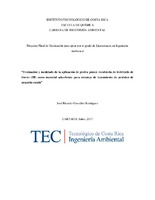Evaluación y modelado de la aplicación de piedra pómez recubierta de hidróxido de hierro (III) como material adsorbente para sistemas de tratamiento de arsénico de pequeña escala
Resumen
In Costa Rica, groundwater contaminated with arsenic (up to 200 μg / L) was detected in the North Pacific and Northern regions in 2008. A possible local solution for its removal is the use of pumice stone coated with iron hydroxide (III) (PPRH) as an adsorbent. In this study pumice stone from Guanacaste was used as support material to coat it with iron hydroxide (III). Adsorption isotherms and breakthrough curves were developed to determine its adsorption capacity. The material had an adsorption capacity evaluated at 200 μg/L of 154,1 μg/g, corresponding to an intermediate-low capacity. The PPRH produces 1790 BVs. This value is in the range reported for adsorbents coated with oxides / iron hydroxides (180-4000 BVs), but far from the range reported for commercial granular adsorbents of iron and titanium (13,000 - 45,000 BVs). In addition, the HSDM model was used to predict optimal operating conditions of the material. These conditions are to operate the system at an empty bed contact time (EBCT) between 7.5 and 10 minutes. Using the HSDM model, the theoretical behavior of the adsorbent was estimated in a communal treatment system and in a home use point system. The estimated duration of the adsorbent in a communal system of 300 people, with a flow rate of 1.08 L / s, did not exceed 15 days, being impractical from the operational point of view. In contrast, the duration can be extended to a period between 3.3 and 8.4 months if used in a point of use system for families made up of 10 and 4 people, respectively. PPRH demonstrates that it can remove arsenic but its application in a communal treatment system is not feasible. However, it is for use in point-of-use systems.
Descripción
Proyecto de Graduación (Licenciatura en Ingeniería Ambiental) Instituto Tecnológico de Costa Rica, Escuela de Química, 2017.


